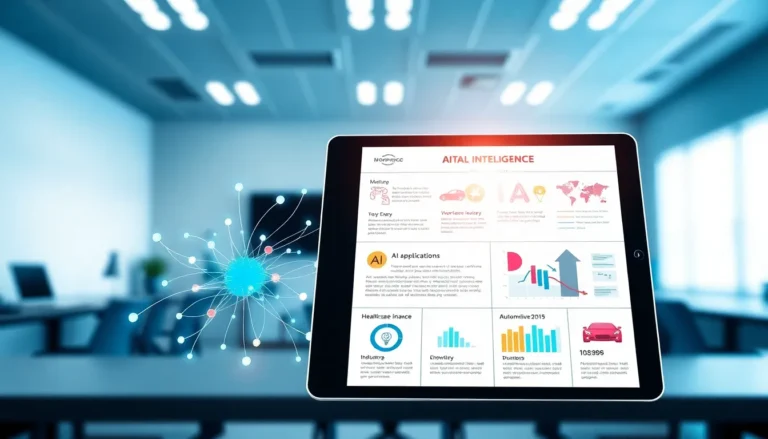Table of Contents
ToggleArtificial Intelligence has been the hottest topic since sliced bread, no, wait, scratch that, it’s hotter than the bread coming out of the toaster. Applied AI is revolutionizing industries, speeding up processes, and making decisions faster than you can say “machine learning.” If you’re curious about how this tech wizardry can transform the way businesses operate and adapt, you’re in the right place. Buckle up as we jump into the world of applied artificial intelligence and how it’s reshaping our future.
Understanding Applied Artificial Intelligence

Applied Artificial Intelligence (AI) refers to the utilization of AI technologies to solve specific real-world problems. While traditional AI focuses on creating systems that can think or learn similarly to humans, applied AI narrows its attention to practical applications across various industries. Think of it as the Swiss Army knife of the tech world, flexible, efficient, and incredibly useful.
This field encompasses a multitude of technologies, including machine learning, natural language processing, and computer vision. Each of these technologies can be tailored to meet the unique demands of different sectors, whether it’s healthcare diagnosing diseases through image recognition or finance automating transaction approvals. By marrying theory with practice, applied AI makes innovations accessible to the everyday business owner, not just the tech elite.
Key Applications of Applied AI
Applied AI is making waves in a variety of sectors, and its applications are as diverse as they are effective. Here are some key areas where this technology shines:
Healthcare
From predictive analytics to virtual health assistants, AI is transforming patient care. By analyzing vast amounts of medical data, AI can assist doctors in diagnosing conditions faster and more accurately.
Finance
Consider AI-driven credit scoring platforms that sift through diverse data sources to make lending decisions. These systems are quicker and more accurate than traditional methods, allowing financial institutions to serve more customers efficiently.
Retail
Personalized shopping experiences powered by AI algorithms offer tailored recommendations based on customer behavior. The result? Happier, more engaged customers and increased sales.
Manufacturing
In manufacturing, AI optimizes supply chains and monitors equipment health. Predictive maintenance, for instance, anticipates when machines will need repairs before they break down, saving time and dollars.
Transportation
AI solutions are revolutionizing logistics and transportation, from autonomous vehicles navigating city streets to optimized delivery routes that reduce costs and time.
Each of these applications showcases AI’s capability to tackle complex problems and enhance operational efficiencies.
Benefits of Implementing Applied AI Solutions
The benefits of integrating applied AI into business processes are profound and multi-faceted:
Increased Efficiency
AI can process and analyze data far quicker than any human could. This speed not only streamlines operations but also enhances productivity levels.
Cost-Effectiveness
Automating routine tasks can lead to significant cost savings. Businesses can redirect resources to more strategic ventures instead of mundane chores.
Improved Decision-Making
AI analyzes data patterns and trends, enabling companies to make informed decisions based on real-time analytics rather than relying on intuition.
Enhanced Customer Experience
With tailored recommendations and immediate customer support through chatbots, businesses can significantly improve their interactions with consumers.
Greater Innovation
By automating time-consuming tasks, employees can focus on creativity and innovation, eventually driving the business forward.
Challenges and Considerations in Applied AI
Even though the myriad advantages, integrating applied AI isn’t without hurdles. Organizations must navigate:
Data Privacy Concerns
As AI systems rely heavily on data, safeguarding sensitive information is paramount. Striking a balance between innovation and privacy can be a complex try.
Implementation Costs
While AI can lead to cost savings in the long run, the initial investment in infrastructure and talent can be prohibitive for some businesses.
Skills Gap
The AI landscape is continuously evolving, and many organizations face a shortage of skilled professionals who can manage and operate these advanced systems.
Ethical Considerations
As AI grows in capability, ethical issues surrounding bias in algorithms and decision-making have come to light. Companies need to ensure that their AI systems are designed with fairness and accountability in mind.
Future Trends in Applied Artificial Intelligence
As technology advances, so too does the landscape of applied AI. Here are some trends to watch:
Increased Human-AI Collaboration
Rather than replacing human jobs, the future may see AI as a collaborative partner, augmenting human skills and decision-making abilities.
Rise of AI Ethics
Organizations will likely place more emphasis on ethical AI frameworks. Developers must consider the societal implications of their algorithms to foster trust and acceptance.
Ubiquity of AI Solutions
As the barriers to entry drop, more small and medium businesses will adopt AI solutions, bringing innovative changes to traditional operations.
Focus on Explainability
Demand for explainable AI will grow, as users increasingly want to understand how AI systems make decisions, contributing to transparency and trust.







